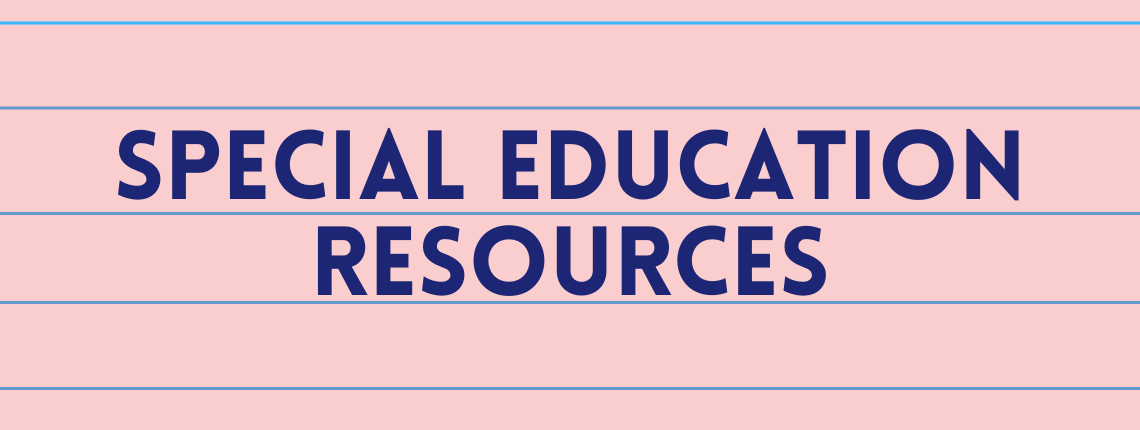Special education students often need specialized supplies to help them focus, manage their emotions, and participate fully in the classroom. These materials can be costly but are important for creating an equitable classroom environment.
To help teachers access the supplies they need, we’ve put together a list of items you can spend your AdoptAClassroom.org funds on. We’ve organized our resources by students’ needs to make it easy to navigate. Additionally, we’ve added free resources you can use to help make your classroom more inclusive for all students.
Our list of resources is not limited to special education teachers. We know that teachers in general education classrooms want to support their students with disabilities, but it can be tough to know where to start. We hope this list offers helpful guidance and tools to better support your students.
Please note: AdoptAClassroom.org is sharing these resource(s) with the intent to spread awareness and promote conversation among educators. Sharing a resource is not an endorsement of the resource for classroom use or an endorsement of any opinion the resource creator may hold. Educators are the experts on their students’ needs and their school’s policies. Please always be mindful if a resource is a good fit for your classroom.
The stock and availability of the following items may fluctuate. AdoptAClassroom.org cannot guarantee the availability of any of the items below.
AdoptAClassroom.org wants to help teachers build more inclusive classrooms for their students with disabilities. Our Inclusive Classroom Fund supports teachers who need resources to make their classroom the best learning environment possible for ALL their students.
To apply for the grant next time we open applications, make sure that you’re registered with AdoptAClassroom.org to be notified when we’re accepting applications.
Free Resources for Special Education Teachers
The NEA offers a list of important disability terms, acronyms, and definitions in easy-to-reference alphabetical order.
How to celebrate Special Education Day (December 2nd) in your classroom.
Lesson plan on understanding and challenging ableism from the Anti-Defamation League.
In 2010, President Obama signed “Rosa’s Law,” which removed the outdated and harmful term “mentally retarded” in federal and education policy. Learn more about Rosa’s Law and share why the word “retarded” is harmful with your students.
Seven tips for a sensory-friendly classroom.
In honor of Special Education Month, here are some content creators you can follow:
- @Mr.JackCat is a disabled teacher of disabled students.
- Skye Tooley is a queer, autistic educator who posts about trans and autistic policy concerns and lessons.
- @TheAutismDad is a single parent raising three autistic sons. He centers their experiences as autistic people and his experiences raising them. He even featured AdoptAClassroom.org on his podcast.
- @Neurowild is a speech pathologist and autistic, ADHD parent to three neurodivergent kids. Their cute cartoons articulate the different experiences and needs of an autistic and/or ADHD person.
- @fidgets.and.fries is an autistic parent of color of autistic children and a children’s book author.
- @NotAnAutismMom is a former educator advocating for autistic people and changing narratives around autism and disabled students.
If you have resources you would like to add to this list, please email us at [email protected] and we’re happy to add it!
Special Education Teacher Resources from our Marketplace
For students with sensory sensitivity…
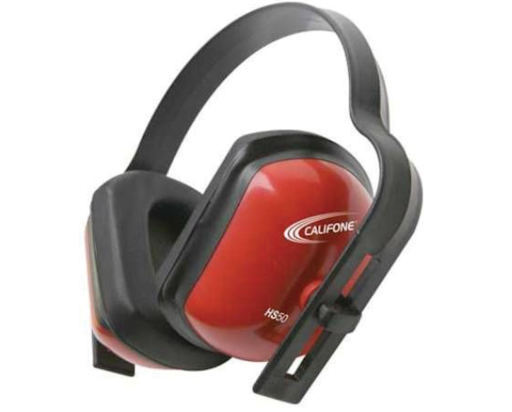
Califone Hearing Safe Protector Hear Muffs from School Specialty
School environments can be stressful for students with noise sensitivities. A pair of noise-reduction headphones can make it much easier for students to concentrate on their schoolwork.
Abilitations Cozy Shades, Spring, Set of 4 from School Specialty
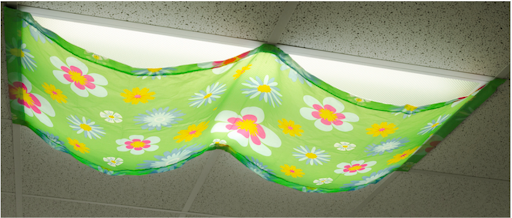
Classroom lighting can overwhelm the senses and make it challenging for students to focus and feel physically comfortable in the classroom. Lighting shades like these can help lessen the glare while adding some decorative flare.
For students who need sensory input…
Some people, especially neurodivergent people, need sensory input in order to concentrate and regulate their behavior. Having items like weighted blankets, bounce bands, and flexible seating can support students’ learning.
Weighted Objects
School Specialty carries a variety of weighted blankets in different sizes, weights, and patterns. They also stock weighted pads and neck wraps as sensory-seeking alternatives.
Flexible Seating
Many of our vendors carry items ranging from cushions, to bouncy bands, to wobble stools that can provide sensory input that helps students self-regulate. For example, our vendor School Specialty has an adapted-inclusive section that can be accessed through the AdoptAClassroom.org marketplace.
For students with physical disabilities and fine motor challenges….
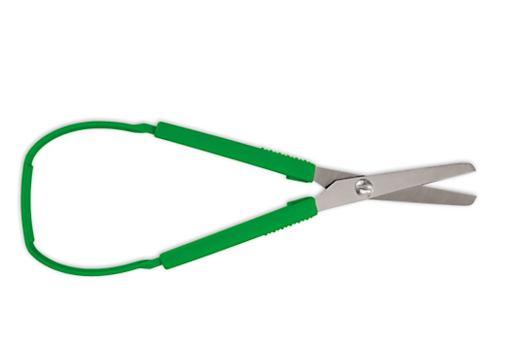
Easy-Squeeze Scissors from Lakeshore Learning
Young students and students with muscle issues in their hands may have a hard time using scissors to participate in classroom craft activities. Adding easy-squeeze scissors can help make your classroom more accessible for special education students.
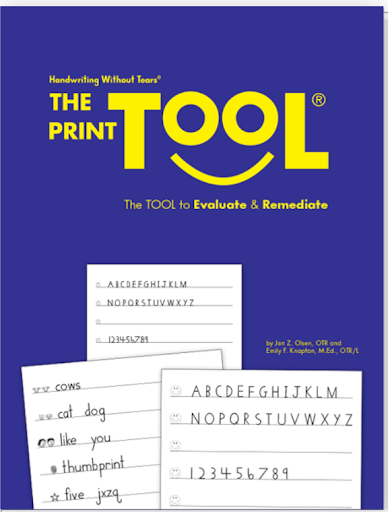
The Print Tool® Evaluation & Remediation Package from Learning without Tears
This handwriting assessment and remediation package is useful for students with fine motor challenges.
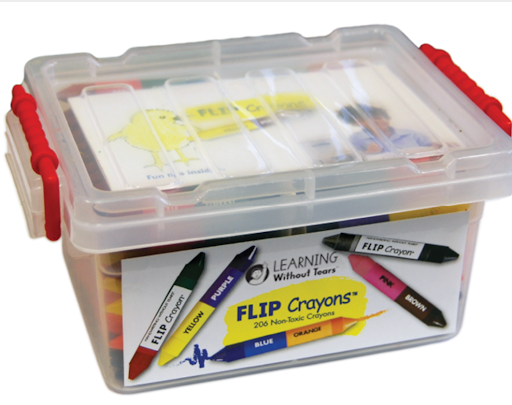
FLIP Crayons® from Learning Without Tears
These crayons can help students learn proper grip. This tub contains 206 crayons, so you’ll have all the colors you need for your students to create beautiful art.
For students who need representation
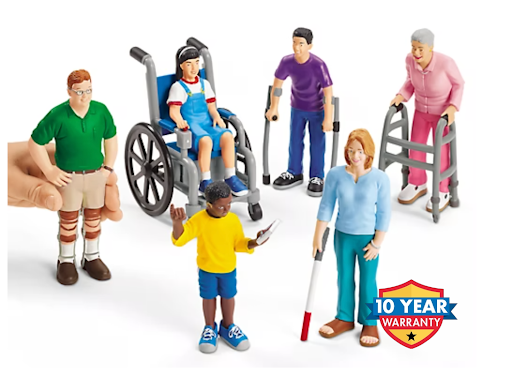
Lakeshore Block Play People with differing abilities
It’s important that ALL students can see themselves represented in the stories they hear and the toys they play with. Lakeshore Learning offers a set of dolls to engage students in play and imagination with different types of bodies and abilities.
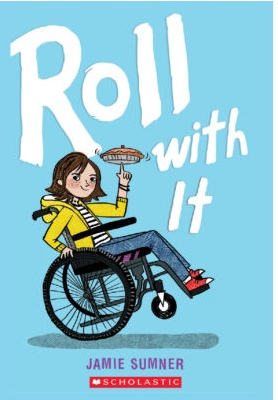
Roll with It! from Scholastic
This middle-grade novel by Jamie Sumner features a protagonist who is obsessed with baking and uses a wheelchair. When she goes to a new school, she has to overcome new challenges facing her and her family.
